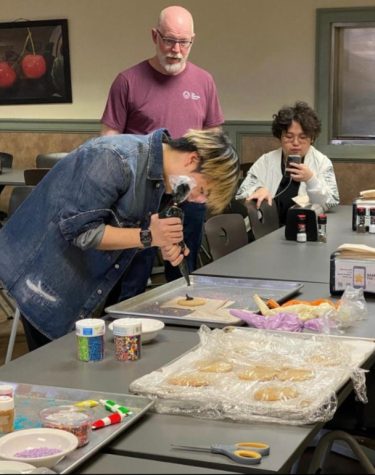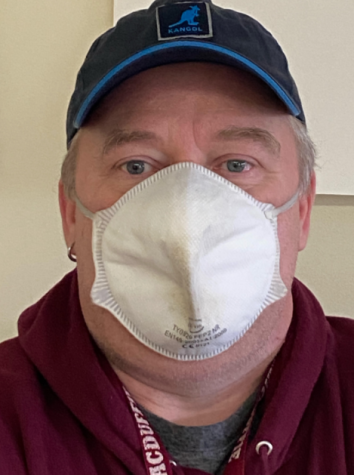Minding your Mind: Mental Health Awareness Speaker Visits MacDuffie
February 28, 2019
On Jan. 25, 2019, Andrew Onimus from the organization Minding your Mind came to the MacDuffie School to talk about mental health issues such as depression and anxiety.
Minding your Mind is a speaker program with an objective to provide mental health education to adolescents, teens, and young adults. They are trying to break the silence surrounding mental health issues and illnesses and reduce the stigma and destructive behaviors often associated with them.
According to their website, one in four teens will experience a mental health issue, yet less than 20% actually seek help, part of the reason why it is important to break the silence.
Dean of students Trish Cox said that this speech would “be very powerful” because Onimus’ personal story began with athletics— something that the many athletes at MacDuffie relate to. She also felt the event was impactful overall.
“It is very cool we are opening up about this topic because many schools don’t. It is so important to get it in the open to let the kids know there is help available and it is okay to ask for help. We need to be aware and be supportive of these kids,” she said.
When Onimus visited MacDuffie he spoke of how he had a seemingly perfect life entering his senior year in college, something relatable for students who may struggle inwardly despite a lack of visible issues. Onimus called this, “1,000 feet.” He was a starting defensive back for the football team, named the captain of the track and field team, and had a full-time accounting firm position in Philadelphia lined up after he graduated college.
This soon changed for Onimus when he got an injury in the first football game of the season. Largely because of this Onimus explained, “I lost my identity and began to deeply struggle.”
Athletes here at MacDuffie can relate to Onimus. It is not uncommon to get injured as an athlete. You don’t see it coming or can prepare for it— it just happens.
Onimus explained how he began to not feel like himself, getting only 2 to 3 hours of sleep a night and seriously struggling in his academics. He began to isolate himself, his social life went down, and he would enjoy nothing. These are some common signs of depression.
Onimus would think to himself, ‘Snap out of it,’ or ‘I can’t have a mental disorder;’ a very common mindset to have. He kept these feelings to himself, part of what caused him to start using negative coping skills. Onimus started to harm himself and abuse drugs and alcohol.
Through confiding in someone he might have not formed these coping skills, a realization that leads to an understanding of the great importance of seeking help.
In one particularly bad anxiety attack, Onimus began to have suicidal thoughts and all he wanted was “the pain to stop.” He then had to call his mom, who brought him to the ER.
Onimus explained that the doctor asked him three questions at the ER: “Are you hopeless? Are you suicidal? Do you have a plan to self-harm?” Onimus was scared when the answers were yes to all three of these questions.
Onimus was diagnosed with clinical depression and anxiety. The doctor said to him, “this is real, you need help, and that is okay.”
Onimus said that this is very important to realize if you are struggling.
Onimus then went to a therapist and disliked it. He went to many different therapists until he found his “life-changing” therapist.
In the first session this therapist asked Onimus if he had anything in his life that was just okay. Onimus replied with, “Frosted Mini-Wheats.” The therapist then told Onimus to hold onto those Frosted Mini-Wheats.
Onimus explained, “Sometimes you just need to find the little things to help you on a bad day. And for me, that was Frosted Mini-Wheats.”
During the sessions, Onimus was taught many positive coping skills. This included how to alter his thinking, meaning if he was having negative thoughts he would twist the thoughts to be positive. He was also advised by his therapist to watch TV shows or movies that “make you laugh.”
After six to seven months of therapy and medication, Onimus decided to tell his track team about his depression and anxiety. He explained it was a very emotional speech and many of the teammates including himself started to cry. He explains that he told his team that, “I see the light at the end of the tunnel.” Onimus says that the reaction from his teammates was incredible.
“My teammates stated opening up about themselves. One told me that his sister had an eating disorder, one told me they have depression, and others simply said thank you. I had no idea that my teammates were going through this and it really shows that you never know what someone is going through and no one talks about their struggles.”
Onimus found out shortly after he was diagnosed with depression and anxiety that there were mental health issues within his family. He lost his uncle to suicide but he did not know about this because “no one talks about it.”
Onimus said, “You cannot touch mental illness, you can’t see it, and it’s hard to talk about.”
Onimus explained that recovery was the toughest experience he has ever had to go through.
“I thought recovery was going to be a smooth road, and I was so wrong. It took me a long time to realize that it is okay to stumble and it is okay to fall down. That there will be good times and there will be bad times,” he said.
Onimus had to step back from his responsibility and dropped out of college to take care of his health. However, a couple years later he went back to college and graduated.
Onimus’ story happened 4 to 5 years ago. He ended his talk saying, “I love life and I am happy because I got the help I need. Please, everyone, share hope and happiness and know that you are not alone.”
The student’s reactions were astonishing. Some students had tears in their eyes as this speech came to an end.
Sophomore Jaidan Luis said, “The speech was so incredibly relatable and beautifully written. I am a soccer player and I had a concussion for over a year and I could relate to his struggles. His words really touched me.”
If you or someone you know is in emotional distress or suicidal crisis, call National Suicide Prevention Lifeline 1-800-273-TALK (8225).







